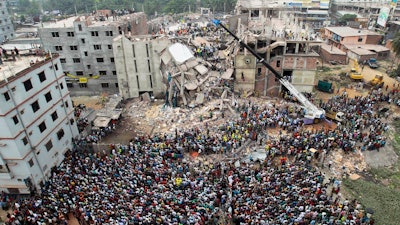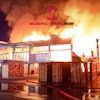
DHAKA, Bangladesh (AP) — Dozens of global clothing companies are not complying with a plan to ensure better safety in Bangladesh garment factories following the deadly collapse of a building four years ago, a rights group said Monday.
Only 29 out of 72 recently contacted companies are releasing information about how they source their products in Bangladesh, and "many brands have held out completely," New York-based Human Rights Watch said in a report.
That makes it impossible to hold them accountable for ensuring safe conditions at factories they work with, the group said.
Bangladesh's garment industry has invested more than $1 billion in safety improvements since April 24, 2013, when the Rana Plaza garment factory complex collapsed outside Dhaka, killing more than 1,130 workers and injuring 2,500.
The collapse highlighted grim conditions in the country's garment industry, the second largest in the world with about 4,000 factories employing about 4 million workers and earning $25 billion a year from exports, mainly to the United States and Europe.
Only 17 companies are now meeting the minimum disclosure standard, while some others are starting to move in the right direction, the report said.
"But the industry still has a long way to go," the group said in a statement. It said the 72 clothing and footwear companies were contacted in the past year by a coalition of labor and human rights organizations that endorsed a Transparency Pledge, which urged the companies to adhere to a minimum standard for publishing supply chain information. They said the minimum standard reflects corporate disclosure practices and aims to foster a level playing field in the industry.
Following the 2013 disaster, global clothing companies joined U.N. agencies and the Bangladesh government in promising to improve safety standards.
Representatives from North American and European brands have visited the country's garment factories to suggest improvements or sever ties with factories that failed to improve.
The government has also hired more than 350 new factory inspectors and passed legislation setting up a workers' welfare fund and allowing stronger union representation.
The companies say the efforts are paying off.
The Alliance for Bangladesh Worker Safety, a group of 29 North American brands, lauded the industry's progress over the last four years. The group has 775 factories in its network.
"Our comprehensive programs have begun to transform an industry once repeatedly touched by tragedy," it said in a statement Monday.
"Most importantly, our efforts have directly translated into lives saved: Not a single garment worker has perished in an Alliance factory since our remediation work began," it said.
Low wages in the South Asian country have attracted global apparel brands and retailers.






















